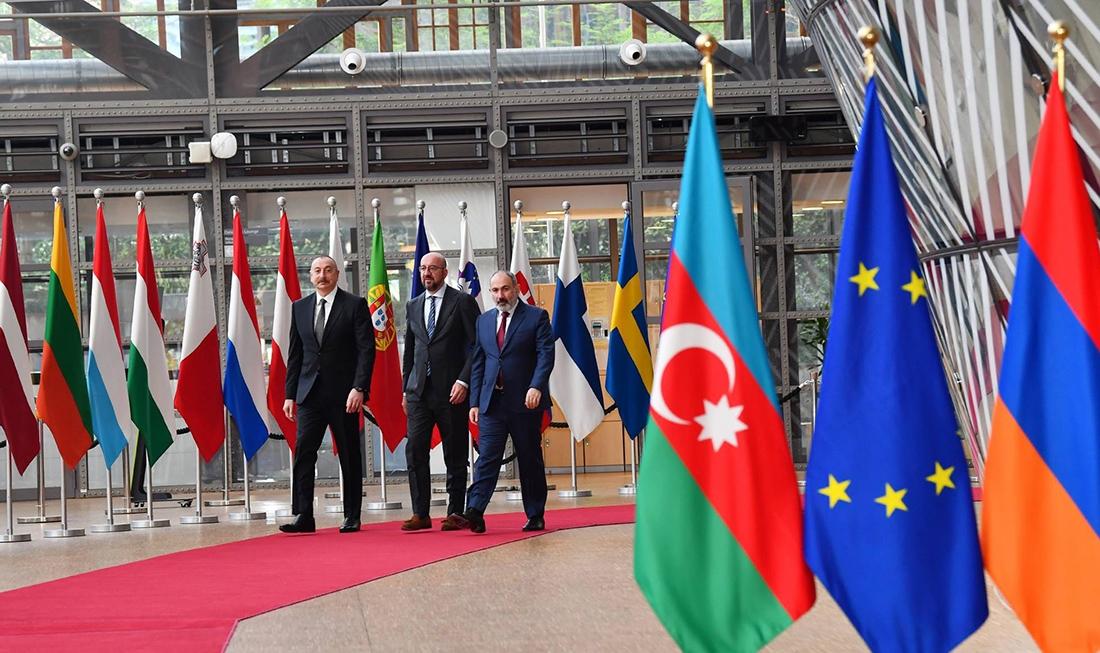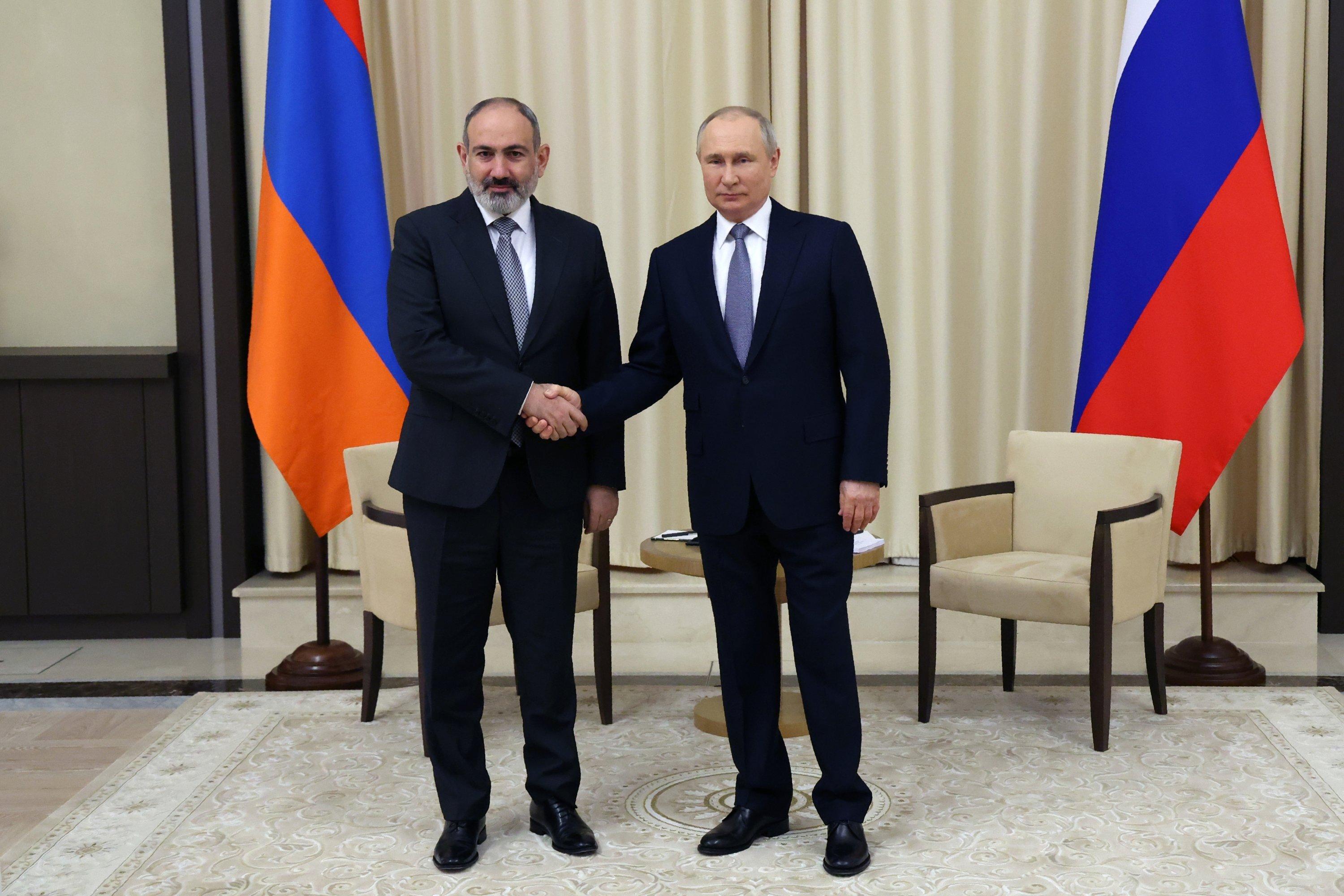Azerbaijan's scepticism, Russia's concerns, & France's role in the South Caucasus Geopolitical chess
Baku and Moscow have voiced nearly simultaneous concerns regarding the upcoming April 5 high-level meeting in Brussels with Armenian Prime Minister Nikol Pashinyan, European Commission President Ursula von der Leyen, and US Secretary of State Antony Blinken in presence.
Baku & Moscow synchronize concerns over Armenia
Amid escalating Russian rhetoric, particularly in the aftermath of the tragic Crocus terror incident, the Kremlin appears resolute in safeguarding its national interests within its own sphere of influence, as Armenia is gradually drifting away from the Kremlin orbit by diminishing its engagements with Russia.
In the absence of a peace deal with Yerevan, Baku continues to harbor concerns about the European Union Monitoring Mission in Armenia (EUMA) as well as the activities of pro-Armenian lobby groups. It expresses apprehension over Paris' broader intentions to undermine the established peace framework and perpetuate chaos in the region, viewing the upcoming event as a threat to its interests.
Azerbaijan's concerns amidst rising geopolitical tensions
Amidst the anticipation surrounding the forthcoming joint EU-Armenia-US conference, Azerbaijan has voiced deep-seated skepticism regarding the implications for regional dynamics.
From unease over the transformation of the EUMA to apprehensions about France-led militarization efforts, Baku's concerns reflect a complex web of geopolitical considerations. As the region navigates uncertain waters, Azerbaijan's stance underscores the need for caution and cooperation to safeguard peace and stability.

The upcoming joint EU-Armenia-US conference has sparked considerable interest and scrutiny in the geopolitical landscape, particularly regarding its potential implications for regional dynamics. With plans to discuss and potentially sign a document on security guarantees for Armenia, speculation has arisen about the emergence of a trilateral military alliance in the region. This development prompts questions about Azerbaijan's stance on the planned conference.
Azerbaijan's position, as articulated by the Foreign Ministry, reflects a deep-seated skepticism towards the EU's involvement in the region, especially in light of past experiences. Despite Azerbaijan's initiation of the peace process with Armenia and its constructive approach towards post-conflict normalization, the regional presence of the EUMA keeps raising concerns.
Originally intended as a short-term civilian monitoring mission along the Armenian border, the transformation of EUMCAP into EUMA, without Azerbaijan's consent, and its subsequent expansion and rhetoric resembling a NATO mission, have been viewed as provocative and detrimental to regional stability.
Furthermore, Azerbaijan expresses apprehension over France-led efforts to militarize Armenia, accompanied by pledges of increased military support and cooperation from other EU member states. The prospect of military components to be mulled at the April 5 meeting is seen as undermining peace-building efforts and exacerbating tensions in the region. Azerbaijan highlights its historical grievances, including armed aggression, occupation, and ethnic cleansing, and laments the lack of comparable support from the EU and the USA.
Looking ahead, concerns are raised about the potential impact of the conference on the ongoing peace process since Azerbaijan perceives it as one-sided and biased, lacking transparency and regional inclusivity. It warns against the creation of new dividing lines and spheres of influence in the region, which could embolden Armenia's revanchist sentiments and provoke renewed provocations against Azerbaijan. Baku emphasizes the need for all parties to refrain from counterproductive actions that could escalate tensions and jeopardize the prospects for lasting peace, stability, and security based on international law.
Russian concerns surrounding Armenia-EU-US meeting
Russian Foreign Ministry Spokesperson Maria Zakharova has highlighted Russia's apprehensions over the upcoming Armenia-EU-US high-level meeting. Her comments reveal deeper geopolitical tensions and strategic calculations underlying Russia's stance towards the event.

Zakharova lambasted Washington, Brussels, and Yerevan for what she perceives as a puzzling naivety regarding the intentions behind the meeting. By suggesting that it's not directed against any third party, she implies a strategic skepticism, indicating Russia's suspicion of Western motives.
Moscow’s mouthpiece asserts that the primary focus of the meeting is explicitly directed against Russia, as communicated by US and EU representatives. This narrative reflects Russia's perception of Western hostility and a concerted effort to undermine its interests in the region.
The Russian spokesperson also raises concerns that the meeting's objectives do not prioritize peace between Azerbaijan and Armenia. Instead, she suggests that it serves to entrench Western influence in the South Caucasus, potentially destabilizing the region and pressuring countries to align with anti-Russian agendas – the point that overlaps with that of official Baku.
Zakharova raps official Yerevan for feigning ignorance about the meeting's nature, implying that Armenia is being manipulated by the West to advance its own interests. This underscores Russia's perception of Armenia as a vulnerable pawn in a larger geopolitical game, highlighting the potential consequences for Armenian sovereignty and interests.
Overall, Zakharova's analysis reflects Russia's broader concerns about Western encroachment in its sphere of influence. By portraying the meeting as a threat to regional stability and Russian interests, she underscores the geopolitical tensions and strategic rivalries shaping dynamics in the South Caucasus.
Moscow-Paris face-off over the South Caucasus
Maria Zakharova also offered a scathing critique of France's activities in the South Caucasus, shedding light on Moscow's deep-seated concerns regarding French involvement in the region.
Zakharova's accusation against France of engaging in intelligence gathering and espionage under the guise of peace and security exposes a profound distrust of French motives. This narrative suggests that Russia perceives France's presence in the Caucasus as driven by strategic interests rather than genuine efforts to maintain stability.
The assertion that France's actions actively undermine peace agreements in the region reflects Russia's concern over the destabilizing impact of French involvement. By implying that France's activities exacerbate tensions and hinder reconciliation efforts, Zakharova highlights Moscow's skepticism towards Western interventions in the regional conflicts.
Moscow's questioning of France's capability to ensure security in the South Caucasus underscores broader doubts about Western powers' efficacy as mediators. Russia's skepticism over France's ability to implement agreements between Azerbaijan and Armenia suggests a lack of confidence in Paris’ role as a guarantor of regional stability.
The comparison drawn between France's actions in the South Caucasus and its operations in Africa serves to underscore Russia's broader concerns about French credibility as an international actor. By highlighting perceived failures or inadequacies in France's conflict resolution and security provision, Zakharova reinforces Moscow's skepticism towards Western interventions in regions it considers within its sphere of influence.
Overall, Moscow’s approach portrays Paris's involvement in the South Caucasus as driven by self-interest rather than a genuine commitment to peace and security. This narrative reflects broader geopolitical tensions and underscores Russia's skepticism towards Western interventions in regions it perceives as within its sphere of influence.








